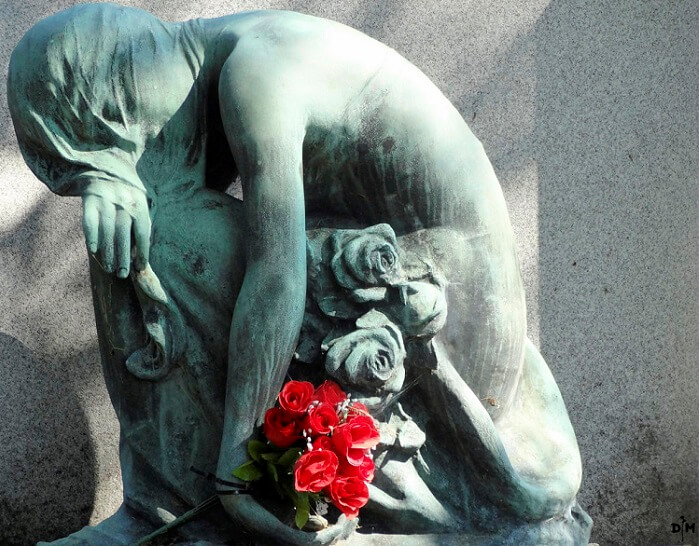Merriam Webster gives grief’s definition as, “deep and poignant distress caused by or as if by bereavement.” While there is no arguing with this grief definition, it lacks a lot of the raw emotion that people often feel when they are working through the grief process. Grace and Peace Unlimited gives a grief definition as, “the normal and natural emotional reaction to loss or change of any kind. In and of itself, grief is neither a pathological condition nor a personality disorder.” While there is nothing wrong with that grief definition, it does not do much to help people who are grieving.
Applying the Grief Definition
The Grief Recovery Handbook gives this grief definition, “Grief is the conflicting feelings caused by the end of or change in a familiar pattern of behavior.” While that is certainly true, it is not very helpful in understanding the normal grief process. Over 30 years ago, Elizabeth Kubler-Ross tried to describe the stage of grief. She adamantly states that each person goes through their own process. Most people, however, will go through each of the five stages.Realize that many people bounce back and forth often. On some days, they may feel that they have accepted the death and are ready to move on while on other days, they feel like they are clear back in denial.
Denial

The first stage of grief is normally denial. Most people feel that the world is meaningless and unimportant as they are simply trying to survive. Most people feel numb while wondering how they can go on to face tomorrow. Many people also wonder what the point of going on is because they realize that their life will never be the same again. Denial is the mind’s way of protecting itself from things that it cannot cope with just yet. Coming out of denial and accepting that you are left behind can invoke some of the hardest feelings to handle during the grief process. Many people who are in denial are in so much shock that they do not even remember doing a task or saying things to others.
Anger
Most people who are going through the grief process feel intense anger next. Understand that often a person bounces back and forth between different stages feeling angry one moment and denial the next. You may feel intensely angry at many different people including God, nurses, doctors and even the person who died. Give yourself permission to feel that anger because it is the only way to get over it. Realize that it is perfectly normal to feel all alone and deserted during this stage. Chances are strong that your anger will become focused on one individual. This is a psychological response that gives structure to your life during the grieving process. For many, the anger becomes like a rope that they can grasp and hold as they face an uncertain future. Realize that your anger proves that you loved enough to truly care. While this emotion is normal, do not be afraid to seek professional help in working through the anger if you think you might hurt yourself or someone else because of the anger.
Bargaining
Those looking on from the outside often see bargaining as highly illogical. However, it is an important step in getting through the grief process. You may find yourself making all types of promises in order to have things return to the way that they were before the death occurred. Many find that they feel intense guilt. Others find themselves questioning every move that they made in the time leading up to the death. Many people wonder why they are still here when the other person was taken away from them. Some people also try to bargain away the pain that they are feeling by promising a higher deity that they will live a perfect life the rest of their days if the pain will just go away.
Depression

The next stage is depression. This stage helps a person move back into reality. Many find that they do not remember much about the bargaining, anger, and denial as time passes. Still, they remember being very depressed. Many find that they no longer have any joy in their life. They stop doing their favorite activities opting to spend time by themselves. They may resist doing things that they know that they need to do. Cleaning the house or taking care of themselves are a couple of good examples. If you love a person who is going through the grieving process, it is very important to stay in contact with a person as they go through this stage. Understand that this depression is not a sign of mental illness. In fact, it is an important part of the grieving process.
Acceptance
The last step of the grieving process is acceptance. You realize that life will always be different, but you will find a level of acceptance about what has happened. It is not about liking what has happened, but it is about creating a new reality. Slowly, one little second at a time, you will find yourself smiling and laughing again. Sluggishly, life will become meaningful again. At first, a person in this stage may feel that they are betraying the person who has died. In very tiny increments, it becomes acceptable to build meaningful relationships again and create a new normal. You may discover that you are ready to take on new projects and build new friendships.
Understand that no one else can build the perfect grief definition for you. Everyone goes through the process on their own. If you are in the process of building your own grief definition right now, give yourself permission to feel the raw emotions that the process requires. Do not try to hide any of those emotions from others. Moreover, do not try to hide them from yourself. You will probably bounce back and forth between steps quite often. Reach out to others that will embrace you on your journey.
Image sources: 1, 2





